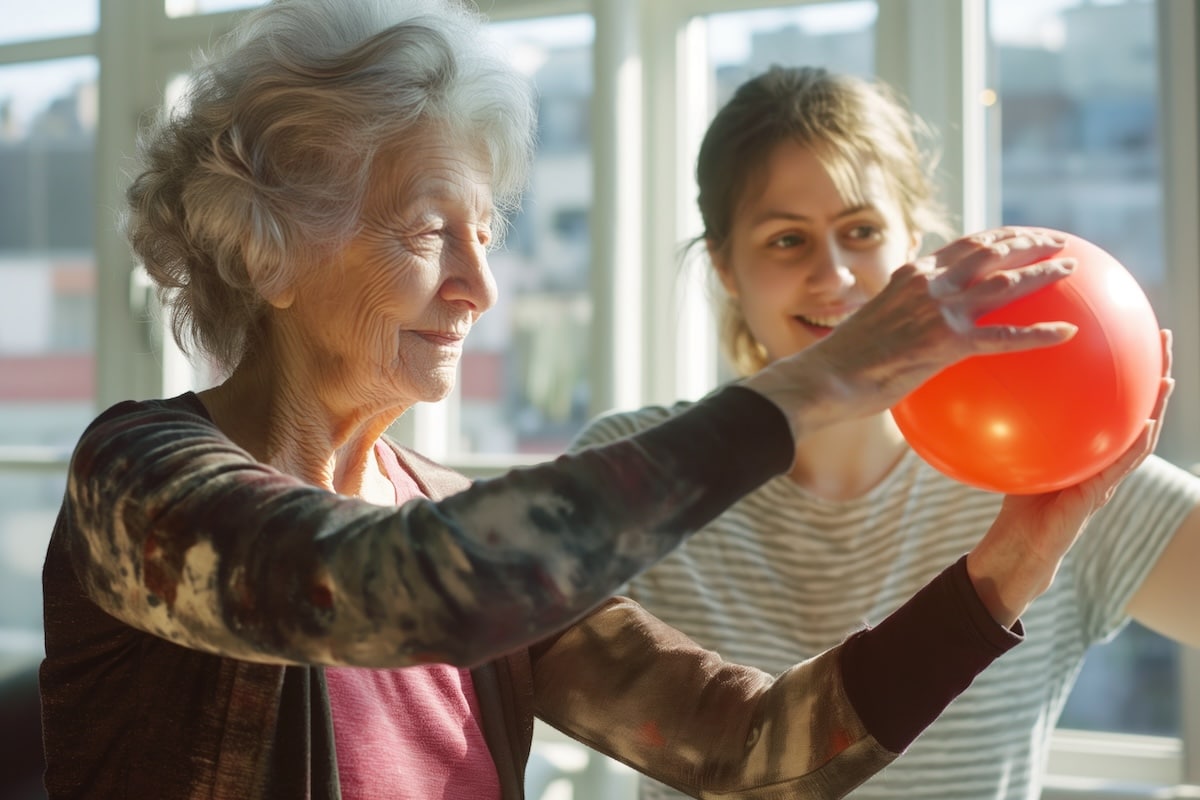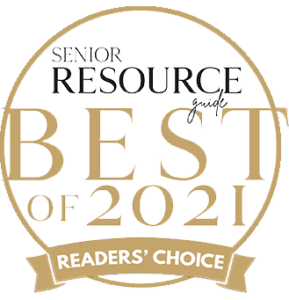According to The National Institute on Aging, strokes are the main cause of serious adult disabilities. Strokes can happen at any age, but the risk increases as we get older. They are medical emergencies that are as serious as heart attacks, but immediate treatment can reduce brain damage and potential complications.
Here are two more pieces of good news:
- The majority of strokes are preventable.
- Effective therapies help prevent stroke-related disabilities.
Still, strokes represent a significant health challenge, particularly for seniors. The Abbey at Westminster Plaza caregiving team advocates for stroke awareness and supports our residents and their family members through the healing journey. We also implement proactive measures that promote their overall well-being.

How do senior strokes happen?
Strokes in the elderly occur when there’s a disruption in the normal blood flow to the brain, leading to a deprivation of oxygen and essential nutrients for brain cells. This inadequate blood supply can cause the affected cells to suffer and eventually die, leaving a lasting impact on a person’s life.
While some brain cells can recover after they’re deprived of oxygen for only a short period, once cells are lost, they cannot regenerate. Although research suggests that new brain cells may help replace those that are lost, this process is slow, particularly for seniors. Therefore, strokes in older adults can lead to challenges with speech, cognition, and mobility.
There are generally two types of strokes: ischemic and hemorrhagic.
- Ischemic strokes occur when a blood vessel supplying blood to the brain is blocked, often due to a clot. There are three leading causes:
- Thrombosis: a clot in a neck or brain blood vessel.
- Embolism: a clot that travels from one part of the body to another, like from the heart to the brain.
- Stenosis: a narrowing of a brain blood vessel, often from fatty deposits on artery walls.
- Hemorrhagic strokes are caused by ruptured blood vessels.
Both scenarios can have devastating effects, but recognizing the signs of a stroke and taking immediate action can be life-saving.
Recognizing Signs of Strokes in Older Adults
At The Abbey at Westminster Plaza, our team members can identify the signs of strokes and strongly encourage everyone else to do the same. If you notice any of the following sudden symptoms – even if they don’t last long – call 911 immediately.
A stroke can present with one or more of these*:
- Confusion.
- Trouble speaking or understanding speech.
- Painful headache with no known cause.
- Face, leg, or arm numbness or weakness, especially on one side of the body.
- Difficulty walking, loss of coordination or balance, dizziness.
- Vision problems in one or both eyes.
- Excessive drowsiness.
- Nausea or vomiting.
Emergency services personnel can start lifesaving treatment as soon as they arrive.
How to Prevent Strokes
Preventive strategies can significantly lower the risk of strokes in older adults, and healthy lifestyle choices are an excellent starting point. We suggest prioritizing regular physical activity, a balanced diet rich in fruits and vegetables, and proper hydration. Monitoring blood pressure, managing diabetes, and avoiding tobacco and alcohol can also help you or a loved one. Regular health check-ups are also essential, as they allow for the prompt management of risk factors.
A supportive environment at home can contribute to stroke prevention. For instance, families can ensure that their loved ones take prescribed medications on schedule and maintain regular appointments with healthcare providers. Engaging them in social activities is also part of the plan; it keeps seniors mentally active and promotes emotional well-being.
Recovering From a Stroke
The road to recovery after a stroke can be challenging, and caregivers and family members play vital roles. Depending on the severity of the stroke, the rehabilitation process can begin shortly after the incident.
Physical therapy, occupational therapy, and speech therapy are components of the recovery journey, and it makes sense to set realistic stroke recovery goals. Families should focus on small daily achievements while providing encouragement and emotional support. Keep in touch with your loved one’s healthcare providers and therapists, too. They can share insights about the recovery journey and manage expectations.
How long can it take to recover from a stroke?
While some seniors may show significant improvements in a few weeks following a stroke, others may take months or longer. This timeline reflects the patient’s age, health prior to the stroke, and the extent of brain damage. Supporting loved ones through this process involves patience, compassion, and a commitment to their needs.
Family members can help the recovery process with adaptive tools and home modifications. These can include installing grab bars in bathrooms, ensuring a clutter-free space for easy navigation, and establishing a new routine that balances rest and activity.
How The Abbey at Westminster Plaza Helps Seniors
Strokes are serious medical emergencies, and our team members work closely with therapy professionals to develop individualized recovery plans that focus on regaining independence. You can expect consistent updates on their progress and continuous support for their evolving needs.
Our holistic care approach addresses the physical and emotional needs of residents, easing the stress on families who might feel overwhelmed by caregiving responsibilities.
Our Wellness Center offers these on-site services and amenities:
- Licensed rehab services, including physical therapy.
- Dinoflex padded indoor walking track.
- Fully equipped fitness center.
- Heated indoor pool and aquatic therapy.
We also help residents with medication management and assist them with bathing, dressing, and grooming. Our personalized care plans prioritize compassion and professional care, aiming for effective rehabilitation and recovery.
Strokes in older adults change their lives, but you can find peace of mind knowing that your loved one is being cared for professionally and with loving support.
We Support Residents with Senior Strokes and Their Loved Ones
Our team is here to support you and your loved one through every step of the recovery journey. Connect with us to learn how we can provide the care and services your family needs. Together, we can build a brighter future for your family. Contact us for a personalized tour.
•This article should not replace medical advice. Talk with your doctor regarding any issues you may experience, especially if you suspect memory loss, dementia, or Alzheimer’s.


